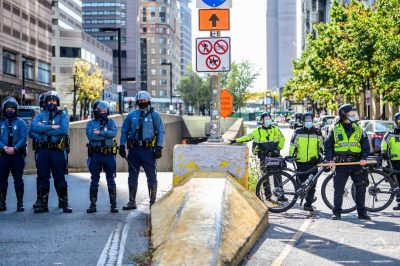The City of Boston will soon create three organizations to implement recommendations made by the Boston Police Reform Task Force created in June.

Mayor Marty Walsh filed an ordinance with the City Council Thursday to create the Office of Police Accountability and Transparency, which was among the primary recommendations made by the task force.
The OPAT will review the Boston Police Department’s internal investigations and civilian complaints.
“Our goal is to achieve historic change in Boston and create a national model for breaking down systemic racism across all aspects of our city,” Walsh said in a City press release. “The recommendations we are enacting today represent the voices of the community advocating for change.”
Jamarhl Crawford, a Boston Police Reform Task Force member, said he believes the OPAT was a “well-thought-out” idea.
“We believe that that is our best shot at pushing the ball forward in terms of what we said: accountability and transparency,” Crawford said. “I would say it’s in the name.”
Walsh also signed an executive order to transform the Community Ombudsman Oversight Panel into the Internal Affairs Oversight Panel.
CO-OP will be absorbed into the Internal Affairs Oversight Panel, giving it additional power to review all completed Internal Affairs cases, according to the press release. The panel will act as an external watchdog for the fairness of internal affairs investigations as well as participate in community outreach, according to the order.
Another executive order released by Walsh will establish a Civilian Review Board consisting of nine residents.
Six of these members will be recommended by civil rights advocacy groups, youth organizations and neighborhood associations, and three will be recommended by the City Council president, according to the order. Members can serve up to two consecutive three-year terms.
Crawford said the Civilian Review Board will give Boston residents a voice in police affairs for the first time.
“It’s civilians who actually get to chime in on their police force,” Crawford said. “It’s not just, ‘Oh hey, Officer McGilliduddy beat up little Timmy.’ That’s not the bulk of it, no. It’s also, ‘Hey, this policy you have over here, we think this could use some improvement.’”
However, Jack McDevitt, director of the Institute on Race and Justice at Northeastern University, said some police unions feel the board will “usurp” their ability to protect their members.
“Police have historically done discipline of officers on their own,” McDevitt said. “So, when you have an external group that’s involved with that, officers feel like they may not understand their world and the incidents that they have to deal with.”
McDevitt said the City must address attitudes within police forces themselves, because implementing policies and trainings doesn’t prove effective in stopping wrongdoing.
“You want to change the culture of the organization to say, ‘We’ll celebrate officers who intervene when another officer is doing something wrong,’” McDevitt said.
McDevitt said the City must fill the panel with people who are respected by the community as well as by BPD.
“If it’s somebody who’s seen as a friend of the police or a constant critic of the police,” McDevitt said, “then that may not be so helpful.”























































































































Katherine • Nov 18, 2020 at 1:28 pm
Jarmahl shouldn’t be on this review board. His statement screams racist. Only example he could come up with was a white Irish officers name. Terrible.